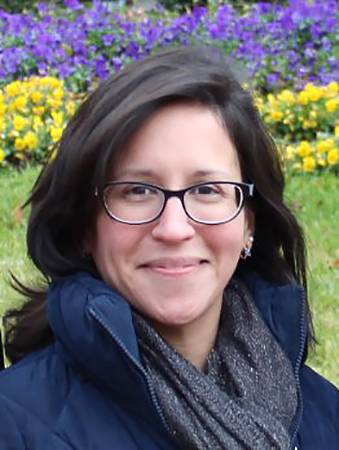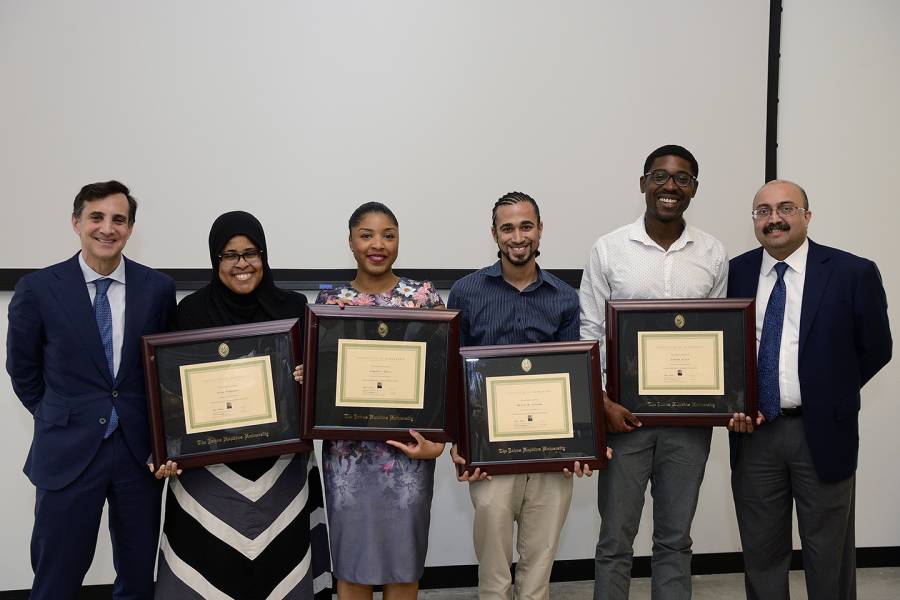The Edward Alexander Bouchet Graduate Honor Society has inducted its first class of members from Johns Hopkins University. Six PhD candidates were recognized for their outstanding scholarly achievement and demonstrated commitment to promoting diversity in doctoral education. They were celebrated at the Yale Bouchet Conference on Diversity and Graduate Education in April and again during a ceremony held Friday at Johns Hopkins University.
Established in 2005 by Yale University and Howard University, the Bouchet Society seeks to recognize and continue the contributions to doctoral education made by Edward Alexander Bouchet, a physicist who in 1876 became the first African-American doctoral recipient in the United States. The Bouchet Society now includes chapters at 17 American universities, with Johns Hopkins joining as an institutional member in 2018.
University President Ronald J. Daniels and Provost Sunil Kumar both spoke at Friday's ceremony, which was held at FastForward U near the Homewood campus.
"Nationwide, African-American, Hispanic, and Native American people comprise only 15 percent of PhD students," Daniels said. "That is why our university is committed to doubling and redoubling our efforts not simply to admit the most excellent and diverse students, but to implement the programs and supports—from fellowships to mentoring programs—that set our students on a trajectory for success here and in their future careers.

Image caption: Maria del Carmen Vitery was inducted into the Bouchet Society posthumously
"As leaders, today's inductees are bringing awareness to the issues facing minority graduate students, advocating for greater representation in their disciplines, and mentoring future generations of scholars and scientists in our public schools."
Added Kumar in a statement to the Hub: "As a research institution, doctoral education and mentorship are centerpieces of the Johns Hopkins mission. Each honoree exemplifies that spirit of investigation and research that has distinguished them as academics, but they have also demonstrated a commitment to leadership and inclusion that will help ensure future generations of thinkers have opportunities to learn and to discover."
The inaugural members of the Bouchet Society from Johns Hopkins were joined at the ceremony by their faculty mentors, who spoke about their academic and leadership qualities. One member was not able to attend due to international travel. Another was honored posthumously.
The honorees are:
Jawara Allen
Biochemistry, Cellular and Molecular Biology
Jawara Allen is a candidate for the combined MD and PhD in biochemistry, cellular and molecular biology at the Johns Hopkins School of Medicine. His research focuses on discovering how Bacteroides fragilis, a gut microbe found in up to 60% of healthy individuals, contributes to the development of colorectal cancer. Allen received a Bachelor of Science in biology from Duke University with a focus on genome sciences and policy. As a Reginaldo Howard Memorial Scholar, he organized lectures and events centered around issues of racial disparities and inequality. He later worked as a National Institutes of Health fellow and has been recognized as an HHMI EXROP scholar and an HHMI Gilliam Fellow.
Throughout his time at the Johns Hopkins School of Medicine, Allen has worked with various organizations—including MERIT, Thread, the Gertrude Stein Society, the Student National Medical Association and the Post-baccalaureate Research Education Program—to mentor and advocate for individuals underrepresented in science and medicine. Allen plans to pursue a career as a physician scientist, working on issues related to infectious diseases in both the clinic and the laboratory.
Allen was joined by his mentor Andrea Cox, a professor in the Johns Hopkins School of Medicine and director of the Medical Scientist MD-PhD training program.
Blaine M. Connor
Cell, Molecular, Developmental Biology, and Biophysics
Blaine M. Connor is a PhD candidate in biology with a focus on neurobiology of the sympathetic nervous system. His research addresses fundamental questions of how essential signaling proteins are transported to their sites of action in polarized sympathetic neurons during nervous system development. Connor is a recipient of the Nathan Boggs Memorial Fellowship for underrepresented graduate students with academic merit, as well as the Victor Corces Teaching Award for outstanding teaching as a teaching assistant at Johns Hopkins University.
Connor received a Bachelor of Science in biochemistry from Kutztown University of Pennsylvania, where he graduated magna cum laude. He is a committed mentor who teaches junior students and is specifically engaged in advocating for diversity in STEM fields and identifying avenues for increasing opportunities for young, underrepresented students in these disciplines. Connor volunteers his time toward student recruitment at undergraduate-focused conferences such as the Annual Biomedical Research Conference for Minority Students, and at professional development conferences at local universities in Baltimore. He aspires to run his own research group one day, working to better understand how neuro-metabolism influences animal physiology.
Connor was joined by his mentor Rejji Kuruvilla, a professor in the Department of Biology.
Sabianca Delva
Nursing
Sabianca Delva is a PhD candidate at the Johns Hopkins University School of Nursing. She is also a recipient of the Ruth Kirschstein F31 fellowship grant from the National Institutes of Health to fund her doctoral work. Using a community participatory approach, she focuses on mobile health technologies, such as Fitbits and smartphone apps, for the management of cardiovascular diseases in Latinos. This process is firmly rooted in the belief that engaging the community will be the key to developing viable solutions to the ever-evolving challenges in health care.
Delva has years of clinical experience and has witnessed firsthand the hardships immigrants undergo navigating the U.S. health care system. Non-English speaking patients often experience structural, cultural, and linguistic barriers when accessing health care, especially for self-care management of cardiovascular diseases. Because of her commitment to helping the Latino community, Delva has received several honors including poster awards at the annual Hopkins Diversity Symposia and the Centers for Disease Control and Prevention Latino Health forum. Delva has also been an active leader on campus and served as the newsletter chair for the Sigma Theta Tau International Nursing Honor Society. She was also vice president and president of the PhD Student Association, where she helped organize professional development programs and promote collegiality among her peers. In her spare time, Delva mentors high school students from underrepresented backgrounds in Baltimore City.
Delva's mentor Patricia Davidson, dean of the Johns Hopkins School of Nursing, also spoke at the ceremony.
Sara Haile
Biochemistry, Cellular and Molecular Biology
Sara Haile grew up in Addis Ababa, Ethiopia, and moved to San Jose, California, when she was 15. The cross-world move was a culture shock in many ways, and she realized the importance and power of seeing people who look like her being successful. While working on her degrees in bioengineering and molecular, cell and developmental biology at the University of California, Santa Cruz, Haile developed her two passions: structural biology research and encouraging those underrepresented in science to enter STEM fields. Upon arriving at Hopkins, Haile joined the Biomedical Scholars Association, the largest student group that supports underrepresented minority graduate students. BSA provides her with a space and community where she feels comfortable expressing herself and discussing things like imposter syndrome and stereotype threat. Now Haile is president of the BSA and works hard to ensure that underrepresented minority graduate students feel comfortable and supported to succeed.
Haile was not able to attend Friday's ceremony due to international travel.
Ayah Nuriddin
History of Medicine
Ayah Nuriddin is a PhD candidate in History of Medicine at Johns Hopkins University. She is currently a Dissertation Fellow at the Consortium for the History of Science, Technology, and Medicine, and was formerly a Graduate Fellow in the Center for Medical Humanities and Social Medicine at Johns Hopkins University. She holds a master's degree in history and a Master's of Library Science degree from the University of Maryland, College Park. Her dissertation, entitled "Liberation Eugenics: African Americans and the Science of Black Freedom Struggles, 1890–1970," analyzes African-American engagement with eugenics, hereditarian thought, and racial science as part of a broader strategy of racial improvement and black liberation. Nuriddin aspires to use her scholarship and activism to create space for diverse voices and experiences in the academy.
Nuriddin was joined by her mentor Nathaniel Comfort, a professor in the Institute of the History of Medicine.
Maria del Carmen Vitery (posthumous inductee)
Cellular and Molecular Physiology
Maria del Carmen Vitery was born in Peru and immigrated to the U.S. as a teen. She obtained her bachelor's degree in biochemistry and molecular biology with honors from the University of Maryland Baltimore County and her master's in biotechnology from Johns Hopkins. She matriculated in the Cellular and Molecular Physiology program at Hopkins in 2016, where she was a Ruth L. Kirschstein National Research Service awardee and made seminal contributions to the understanding of novel chloride channels. Her citizenship and service were exemplary. A volunteer on medical missions with the Peruvian American Medical Society, del Carmen Vitery also served as vice president of policy for the Hopkins Graduate Student Association, public relations chair of the Biomedical Scholars Association, and secretary of the Hopkins chapter of the Society for Advancing Chicanos and Native Americans in Science. She devoted multiple hours each week to children and teens in the Baltimore community as a mentor for high school students facing significant struggle, teaching science and art to elementary schoolers, as a child life hospital volunteer, and teaching dance, an activity for which she herself was tremendously skilled. She is remembered by her peers and colleagues as an exceptional scholar, an outstanding leader, a dedicated citizen, and an even greater human being, whose goodness was contagious and whose light will keep shining in everyone's hearts.
Vitery's award was accepted by her mother Hilda Cerna. Her mentor Steven Claypool spoke.
Posted in University News
Tagged phd, graduate education, bouchet honor society









